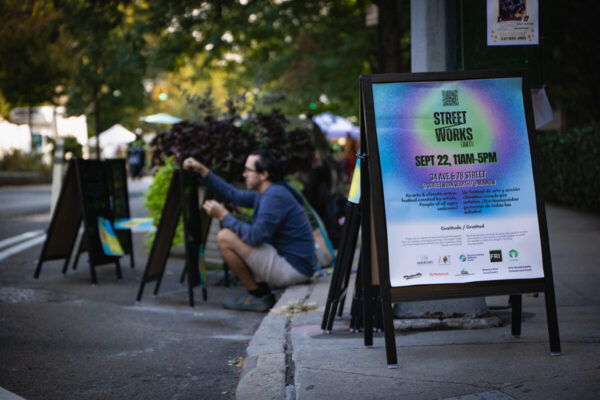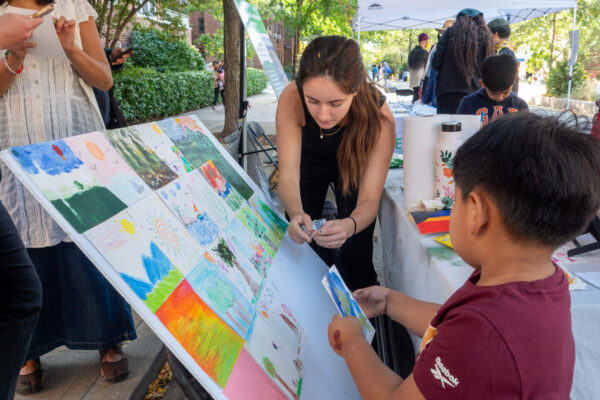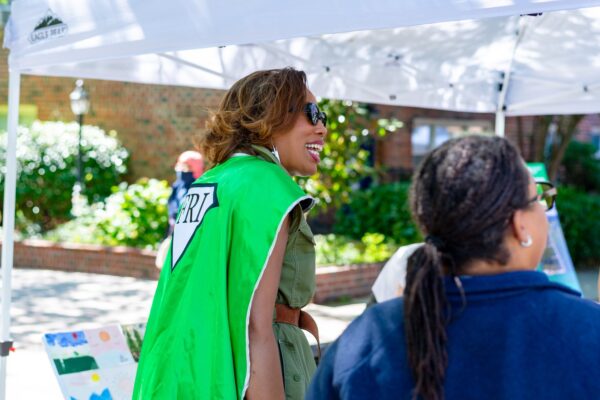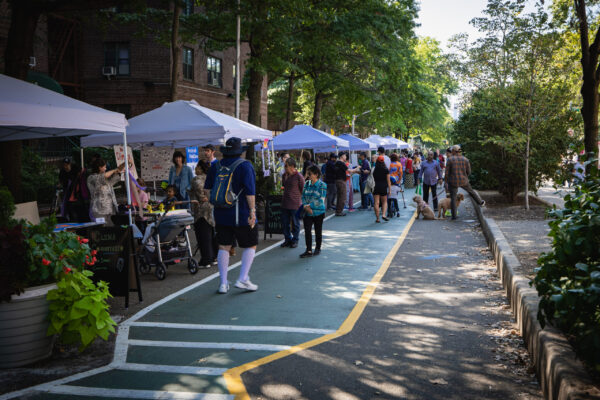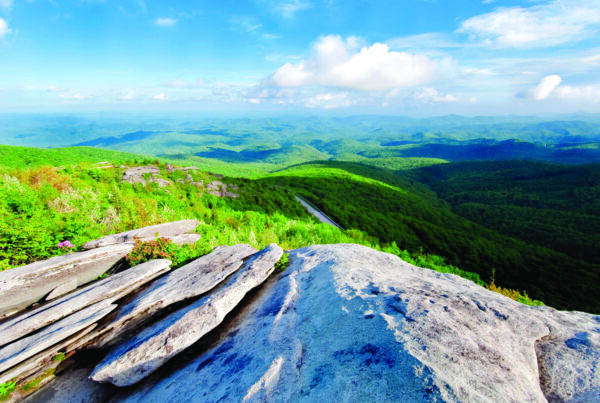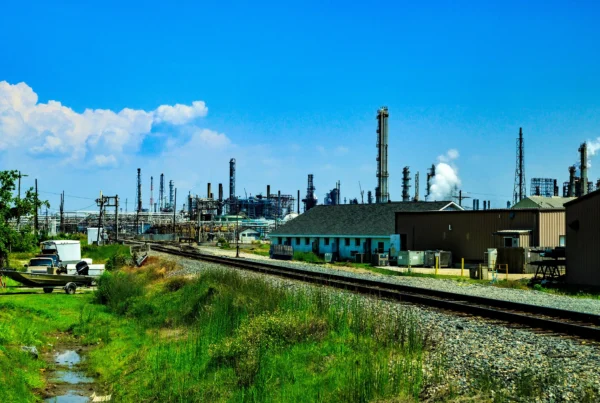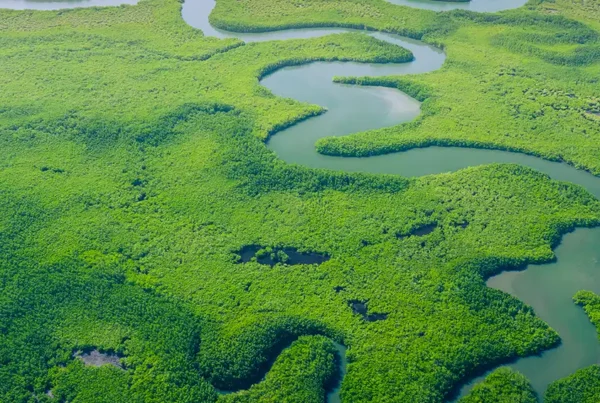This blog tells the story of how Street Works Earth came to be, FRI's participation and the role art plays in the environmental and climate justice movements.
In the environmental space it’s often easier to focus on the road ahead rather than appreciating how far we have come. At the Frontline Resource Institute (FRI), we center joy in our work and take time to purposefully shine a light on climate hope. We also understand that there is a natural intersection between art and environmental justice, from creating documentaries and authoring books to using art as vehicles to tell stories about the environmental injustices impacting our world. That’s why we were elated to support Street Works/Make Justice Normal (MJN) during New York Climate Week at Street Works Earth, a free street arts and climate action festival created by artists committed to fostering joyful, community-led action in public spaces.
Street Works Earth aims to bridge the gap between art and climate action. MJN co-founder Anjali Deshmukh made it clear that Street Works is not just an event. It’s meant to be an anniversary celebration of year-round hard work in a joyful, creative space. Choosing the historically diverse neighborhood of Jackson Heights, Queens for Street Works was intentional.
“Jackson Heights is home for Ernest Verrett — Street Works co-founder — and I. We serve in its public spaces and local climate justice communities year-round as community workers committed to long term solidarity,” explained Deshmukh.
With over 85% of the community being BIPOC, Jackson Heights reflects global communities that are currently facing the harshest impacts of climate change and environmental injustice.
The festival couldn’t have been made possible without the incredibly talented assortment of artists that dedicated their time to co-creating art with the community. The eight artists invited were: All Street Gallery, Kaleidospace, Cecilia Lim, Nitin Mukul, Bayeté Ross Smith, Sabina Sethi Unni, The Veggie Nuggets, and Jing (Ellen) Xu. MJN arts practitioners were Kaimera, Purvi Shah, Anjali Deshmukh, and Ernest Verrett. To encourage the artists to think deeply about how art can highlight the intersection of climate, social, and environmental issues, all invited artists were connected with climate experts from Environmental Defense Fund and Queens Climate Project prior to the festival. Artists and experts were able to reach new audiences due to this connection between science and art communication.
We couldn’t have asked for a more perfect day to hold Street Works and celebrate community, diversity, and creativity. Artists took over an entire street, encouraging all those who walked by to participate. FRI designed Landscaping our Climate Future, which focused on participants’ visions for a just and joyful climate future. The visions came together to create a beautiful collage that highlighted hope for a better tomorrow.
Our Acting Director, Dr. Margot Brown, represented FRI in a unique way. Sporting a bright green cape with “FRI” on the back, Dr. Brown reminded participants that they are superheroes, and their voices and creativity are their superpowers.
“We believe that our FRI grantees are superheroes – these folks are fighting on the frontlines of environmental and climate justice and making the world a better place not just for their communities but for the world,” stated Brown.
Artistic spaces like Street Works allow frontline leaders and community members to use creativity to advocate for a sustainable future and be heroes, no matter their age or where they come from.
Another unique aspect of Street Works among the many Climate Week events (outside of superhero capes) was the number of youth artists and youth participants at the event. One artist collective in attendance was a youth climate action group called Veggie Nuggets. Ranging from middle school to high school students, Veggie Nuggets uses art as a catalyst for change within their community. We know that children and youth face severe health impacts from climate change, building on injustices and inequities and putting some children at greater risk than others. Groups like Veggie Nuggets that cultivate children’s passions for justice, art, and climate action are needed in the fight for a healthier, sustainable future. As the next generation of environmental justice leaders, politicians, scientists, and climate activists, we must continue to learn from youth as we advocate for sustainable, durable solutions.
Street Works also demonstrated the importance of community and community co-creation when it comes to meaningful climate action. Street Works was a free, public event that encouraged all to join in on the creativity while having discussions on climate issues facing Jackson Heights, the state of New York, and beyond. Street Works was founded by community members and created for community members. We know that the people closest to the problems are the closest to the solutions, making festivals like Street Works so crucial in the climate space.
“Co-creative art is joyful. It is a way to embody collective thinking where we all have ownership over what is created. Imagine if that was how environmental policy was actually created?” said Street Works co-founder Ernest Verrett.
To create sustainable and effective policies at all levels, we must include community voices and expertise.
Street Works may be a one-of-a-kind celebration, but it’s not a one-time festival. MJN and FRI are working together to plan for 2025 and beyond to ensure Street Works continues to impact lives. To see a snapshot of this amazing day, check out the testimonies of artists that participated, all of the community creations, and much more! FRI is honored to support and participate in Street Works, and we look forward to uplifting unique, joyful community-centered celebrations that encourage climate action.

